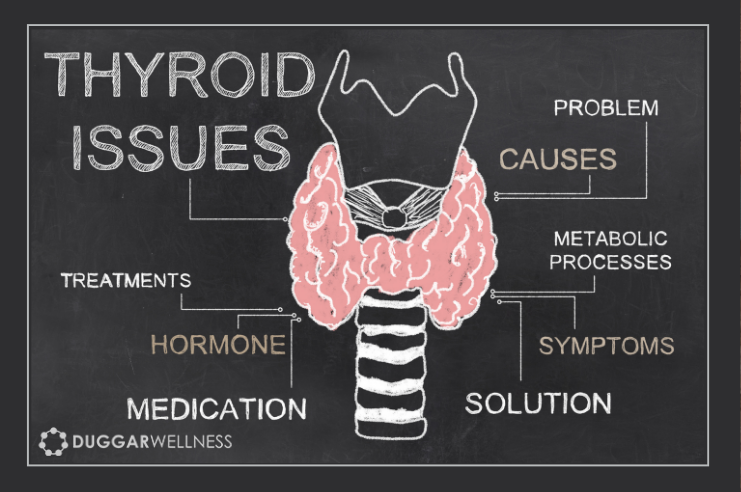We are experiencing a massive epidemic of thyroid disease and dysfunction with over 30 million people suffering from thyroid problems in America. And that number is rising. The thyroid gland is like your body’s master controller for energy and metabolism and every single cell of your body has a receptor site for thyroid hormones so when things go awry with this delicate balance, it can profoundly affect overall health and lead to symptoms of fatigue, depression, cold hand and feet, hair loss, foggy head, dry skin, and weak and brittle nails.
What could be causing this continual increase in thyroid problems?
Well, there are at least two factors that link what is happening in the gut with the disruption of thyroid function.
Let’s first talk about the role that the microbes that live in the gut play in thyroid health. I wrote a blog post a few months ago that covered this important aspect of thyroid function here. In that article, we discussed that the thyroid is signaled by the brain via a hormone called TSH (thyroid stimulating hormone) and then the thyroid gland makes several types of thyroid hormone. The vast majority of which is called T4. T4 is only mildly active in the body until it gets converted to T3 or the “active” thyroid hormone. Much of that conversion happens in the liver but a significant amount of this conversion happens in the gut via the work of healthy microorganisms. If the right gut bugs aren’t there, they simply cause lower amounts of inactive T4 to be turned into T3 and you may get all of the symptoms I mentioned above. Now here is the real kicker, most doctors don’t really test for this on a standard blood test so they miss it and instead just treat the low thyroid with replacement hormones and never even consider the gut.
There is another interesting connection between the gut and the thyroid and this has to do with autoimmunity. Some studies I’ve read indicate that up to 80% of all hypothyroid cases are actually caused by an autoimmune attack on the thyroid called Hashimoto’s disease. What triggers the immune system to go haywire and start to attack itself? Turns out that it comes down to intestinal permeability or what we simply call ‘leaky gut”. When improper diet, stress, NSAID’s, gluten foods, and antibiotics create a change in the amount and diversity of the microbiome of the gut, some of the foods we eat can “leak” through the intestinal wall and into the bloodstream, causing an allergic reaction.
When the immune system is provoked over and over again, it eventually can start to misfire and in a process called “molecular mimicry,” the immune system begins attacking our own body tissues. One of the first systems to show reactivity is the thyroid.
What is the take home message?
If you have symptoms of low thyroid or have been diagnosed by your primary care physician and are taking thyroid medication, you should consider a more comprehensive blood test that looks for thyroid conversion as well as thyroid antibodies. This could dramatically affect your treatment and your results. Second, if you have symptoms of low thyroid, you should strongly consider testing for the health of the gut microbiome and leaky gut.
We see cases of hypothyroidism resolve through the functional medicine model all of the time and we just want to scream it from the rooftops.
 140 N Main, Bountiful, UT 84010
140 N Main, Bountiful, UT 84010  801-677-7878
801-677-7878



One response to “The Gut Microbiome & Hypothyroidism”
[…] The digestive system has a huge impact on the hormone system. The gut produces 80% of our serotonin, a neurotransmitter that is necessary to help us sleep and regulate stress. 70% of immune system function is found in the gut and we are learning that the gut strongly influences our thyroid gland. […]